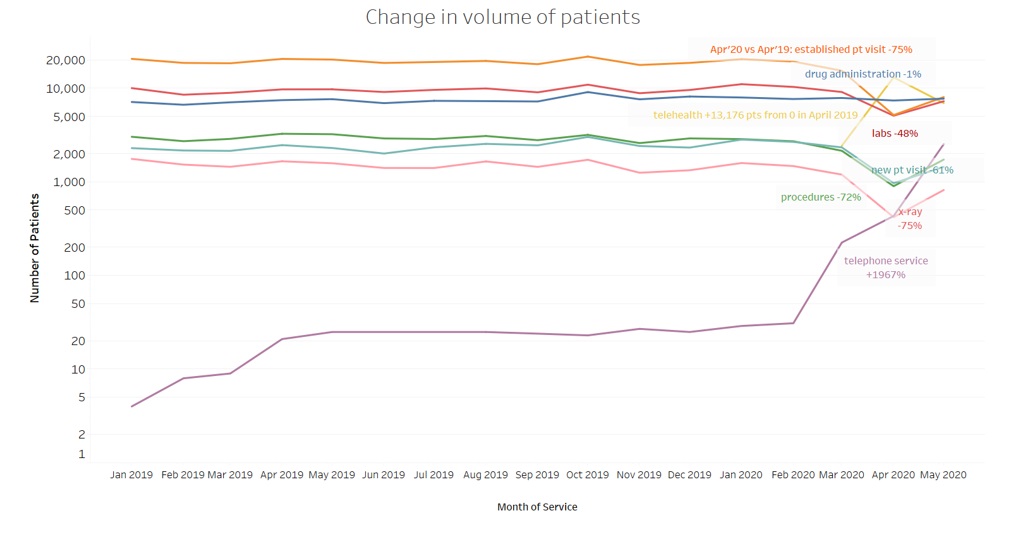Session Information
Session Type: Poster Session B
Session Time: 9:00AM-11:00AM
Background/Purpose: Patients (pts) with autoimmune diseases managed by rheumatologists represent vulnerable population with risk of serious complications if exposed to novel coronavirus SARS-CoV2. The first case of COVID-19, disease caused by SARS-CoV2, was diagnosed in the US on January 20, 2020. By the beginning of April, 42 states implemented stay-at-home advisories limiting non-essential activity including non-emergency healthcare services leading to the majority of routine healthcare visits being conducted via telehealth method using audio and/or video technology. In May states began lifting stay-at-home orders and gradually renewing economic activity. We evaluated impact of these policies on volume and type of care provided by US community rheumatology practices.
Methods: EMR records from the American Rheumatology Network (ARN) – Trio Health Rheumatology registry were used for the study. The ARN is a physician led and owned organization that supports some of the largest independent practices with over 200 practicing rheumatologists across the US. Pts with rheumatic diseases in care in Jan’19-May’20 were selected for analysis. Trends were evaluated for in-office drug administrations, new starts on targeted immune modulating therapy (TIM) both in-office and self-administered, drug administration, new and existing patient visits, telehealth visits, telephonic services, labs, x-rays, minor surgical procedures, and other diagnostic and treatment procedures.
Results: Of 120,780 pts treated in the study period, 19,449 (16%) were treated in central region, 44,055 (36%) in western, and 57,276 (48%) in southern; there were no practices representing northeast hardest hit by COVID-19.
In Mar’20, treated pt number declined 6% vs Feb’20 and 0.4% vs Mar’19; in Apr’20 pt number declined 4% vs Mar’20 and 13% vs Apr’19, while in May’20 pt number was flat vs Apr’20 and down 12% vs May’19. Considering all services delivered by the practices, there was 12% decline in service volume in Mar’20 vs Feb, 28% decline in Apr’20 vs Mar, and 22% increase in May’20 vs Apr; there was 2% decline in Mar, 36% in Apr, and 23% in May’20 vs corresponding months of 2019.
Most affected services in Mar-Apr were procedures, new and established pt visits, x-rays, and labs [Figure 1]. Telehealth was implemented in Mar’20 with 2,449 pts seen via telehealth visits. Telehealth grew 438% in Apr from Mar reaching 13,176 pts and declined 47% in May over Apr. Telephone services were provided to 226 pts in Mar’20 vs 9 pts in Mar’19, telephone services were up 92% in Apr’20 vs Mar and 487% in May vs Apr. Drug administrations were + 3% in Mar’20 vs Feb, -6% in Apr vs Mar, and +7% in May vs Apr.
Growing pre-COVID trend towards home administration of biologics continued during stay-at-home advisory: in May pt starts on home administered biologics overtook starts on practice administered biologics [Figure 2].
Conclusion: During COVID-19 outbreak in the US stay-at-home advisory period significantly influenced care patterns of pts with rheumatic diseases with sharp growth of telehealth and decline in in-person visits, drug administrations, and diagnostic testing. Further research is needed to evaluate these trends as the pandemic continues.
 Figure 1. Change in patient volume
Figure 1. Change in patient volume
 Figure 2. Distribution of starts on targeted immune modulating therapy (TIM)
Figure 2. Distribution of starts on targeted immune modulating therapy (TIM)
To cite this abstract in AMA style:
Huston K, Soloman N, Radtchenko J, Helfgott S, Singh J, Edgerton C. Change in Utilization of Outpatient Services at US Community Rheumatology Practices During COVID-19 Outbreak [abstract]. Arthritis Rheumatol. 2020; 72 (suppl 10). https://acrabstracts.org/abstract/change-in-utilization-of-outpatient-services-at-us-community-rheumatology-practices-during-covid-19-outbreak/. Accessed .« Back to ACR Convergence 2020
ACR Meeting Abstracts - https://acrabstracts.org/abstract/change-in-utilization-of-outpatient-services-at-us-community-rheumatology-practices-during-covid-19-outbreak/
